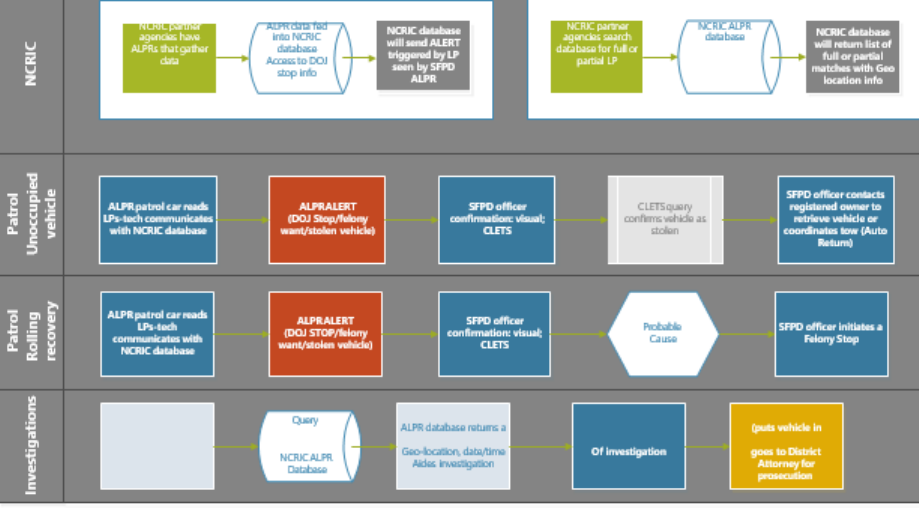
Surveillance Technology Policy
Automated License Plate Readers (“ALPR”)
San Francisco Municipal Transportation Agency - SFMTA
COIT Policy Dates
COIT Approved: October 21, 2021
BOS Approved:
The City and County of San Francisco values privacy and protection of San Francisco residents’ civil
rights and civil liberties. As required by San Francisco Administrative Code, Section 19B, this
Surveillance Technology Policy (Policy) aims to ensure the responsible use of Automated License Plate
Readers (ALPR) itself as well as any associated data, and the protection of City and County of San
Francisco residents’ civil rights and liberties by the San Francisco Municipal Transportation Agency
(Department). This Policy complies with the requirements for the collection of license plate
information set forth in Civil Code section 1798.90.5 et seq) and, in accordance with such law, is posted
on the Department’s website at: https://www.sfmta.com/about-us/sfmta-board-directors/sfmta-
policies/automated-license-plate-recognition-policy.
PURPOSE AND SCOPE
The Department’s mission is to connect San Francisco through a safe, equitable, and sustainable
transportation system.
This Policy describes the manner in which the Department uses or will use ALPR technology to support
this mission, by describing the technology’s intended purpose, authorized and restricted uses, and
requirements.
This Policy applies to all Department personnel that use, plan to use, or plan to procure ALPR
technology, including employees, consultants, contractors, and vendors. Employees, consultants,
contractors, and vendors while working for or on behalf of the City, with the Department, are required
to comply with this Policy.
POLICY STATEMENT
The authorized uses of ALPR technology for the Department are limited to the following use cases and
are subject to the requirements set forth in this Policy.
Authorized Use(s):
1. Enforce parking restrictions and laws.
2. Transit Only Lane Enforcement (TOLE).
3. Link individual vehicles to their times of entry/exit into City-owned parking garages and lots to
accurately calculate parking fees.
4. Identify vehicles that are the subject of an active investigation by the SFPD (e.g., vehicles
included on “hot lists” generated by the SFPD – see Appendix B & C of SFPD ALPR Policy, also
attached to this policy).
5. Analysis of and reporting on parking and curb usage.
Prohibited uses of ALPR technology include uses not described in the Authorized Use(s) above.

2
The Department may use information or data collected from ALPR technology (ALPR data) only for
authorized purposes and not to discriminate against people based on race, ethnicity, political
opinions, religious or philosophical beliefs, trade union membership, gender, gender identity, disability
status, sexual orientation, or activity, or genetic and/or biometric data. Additionally, The Department
may not use ALPR technology to scan footage and identify individuals based on any of the categories
listed in the preceding sentence.
BUSINESS JUSTIFICATION
ALPR technology supports the Department’s mission and provides important operational value in the
following ways:
• Ensures efficient enforcement of parking restrictions and laws while aiding in the calculation of
parking fees, and timely turnover of parking spaces. These uses support the Department’s
mission because they help ensure the sustainability of and more equitable access to the City’s
limited parking resources, which are part of its larger transportation system.
• Links parking tickets to vehicles parked in City-owned garages and lots to calculate customer-
specific parking fees. This use supports the Department’s mission because it maximizes the
integrity of parking revenues, which the Department uses to fund elements of the City’s larger
transportation system, including transit.
• Allows the Department to efficiently enforce Transit Only Lanes which is in alignment with San
Francisco’s Transit-First Policy.
In addition, ALPR technology benefits residents in the following ways:
Education
Community Development
Informs planning, policy development, and pricing for public
parking and loading spaces (e.g., for specific commercial
districts).
Health
Environment
Improves street conditions by ensuring timely turnover of
parking spaces for use by City residents and visitors.
Criminal Justice
Identifies vehicles reported to, and that are subject to, an active
investigation by the SFPD.
Jobs
Housing
Other
Ensures customers with lost tickets are charged the actual value
of their vehicle's stay in City-owned parking garages and lots
instead of the maximum rates.

3
ALPR technology will benefit the Department in the following ways:
Benefit
Description
Financial
Savings
Minimizes physical chalking by Parking Control Officers (PCOs); chalking
can cause repetitive motion injuries, which result in workers
compensation claims filed against The City.
Time Savings
Helps PCOs cover larger geographic areas and improves effectiveness
and efficiency in performing their duties.
Staff Safety
Parking garage staff no longer required to work within confined areas in
parking garages. Minimizes repetitive motion injuries from physical
chalking by automating the process for PCOs to mark vehicles.
Data Quality
Improves accuracy and simplifies parking enforcement duties. Provides
data required to calculate parking fees, especially when patrons lose their
parking tickets within City-owned parking garages and lots. Provides
data to inform potential new on-street parking and curb policies and
regulations.
Other
Provides anonymized data about parking and curb utilization, which
informs planning and policy development.
POLICY REQUIREMENTS
This Policy describes the Department’s data management processes and safeguards to ensure
transparency, oversight, and accountability in its use of ALPR technology and ALPR data. The
Department’s use of ALPR technology, including its collection, retention, processing, and sharing of
ALPR data must comply with this Policy and with all applicable City, State, and Federal laws.
Specifications: The software and/or firmware used to operate the ALPR technology must be up to
date and maintained.
Safety: ALPR technology must be operated in a safe manner. ALPR technology will not be
operated in a way that infringes on civil rights of residents or visitors, including their
privacy rights, or that causes personal injury or property damage.
Data Collection: The Department will minimize the use, collection, and retention of Personally
Identifiable Information (PII) to what is strictly necessary to accomplish the intended
purpose of the APLR technology.

4
The Department will collect ALPR data only as required to execute the authorized
uses of ALPR technology. All ALPR data collected, including PII, if any, will be
classified according to the City’s Data Classification Standard.
The Department shall remove from the raw data it collects using ALPR technology
any incidental data that may be used to identify persons or private information,
including any PII, that is not necessary to accomplish the intended purpose of the
ALPR technology.
ALPR data includes the following data types:
Data Type(s)
Format(s)
Classification
Video and Images
JPEG, G64m
Level 3
Date and Time
SQL or proprietary
Level 3
Geolocation data
SQL
Level 3
Notification: Where reasonably possible given access and safety considerations, the Department
will provide notice to the public of its operation of ALPR technology through
signage located in viewable public areas. These notices will state the purpose of the
ALPR technology being used at the applicable site(s)
The Department’s signs will include the following information (as applicable) about
the ALPR technology:
Description of the technology used
Description of the authorized use(s) or purpose(s)
Type of data collected
Whether persons be individually identified
Data retention schedule
Department’s name
Department’s contact information
Access: Persons with access to ALPR data must adhere to the following rules and processes:
• Authorized users must complete mandatory training and obtain login credentials.
• Only authorized users may use ALPR technology or access ALPR data.
• Authorized users must log into tablet or computer, as applicable, to access ALPR data.
A. Department employees
Once collected, the following roles and job titles are authorized to access and use
ALPR data that is collected, retained, processed, or shared:
• 104x – IT Staff
• 109x – Operations Support Admin
• 182x – Administrative Analyst
• 184x - Management Assistant
• 917x - Managers

5
• 5277 – Planner I
• 5288 – 5290 Transportation Planners
• 8214 – Parking Control Officer(s)
B. Members of the public, including criminal defendants
With respect to public access to ALPR data, the Department will comply with
applicable law, including the California Public Records Act and San Francisco
Sunshine Ordinance.
Data Security: The Department will secure any PII against unauthorized access, processing,
disclosure, and accidental loss, destruction, or damage. ALPR data collected and
retained by the Department will be protected by the safeguards appropriate for its
classification level(s).
To protect ALPR data from unauthorized access and control, including misuse, the
Department shall, at minimum, apply the following safeguards:
• Authorized users require unique login credentials to access ALPR technology,
which is accessible on portable tablets and on workstations.
• All access to and activity in the ALPR system is logged and can be audited.
Data Sharing: The Department will endeavor to ensure that other agencies or departments with which
it shares ALPR data receive a copy of and comply with this Policy.
The Department will ensure administrative, technical, and physical safeguards are in
place before sharing ALPR data internally with other City departments and with entities
outside the City (e.g., other government entities, contractors, vendors). (See Data
Security).
Before sharing ALPR data that contains personal information outside the Department, if
reasonably possible, the Department will take measures (e.g., de-identification,
anonymization, aggregation, etc.) to protect the identities of individuals.
Further, in sharing ALPR data, the following shall be prohibited: (1) the processing of
personal data to reveal a person’s racial or ethnic origin, political opinions, religious or
philosophical beliefs, or trade union membership; and (2) the processing of genetic
data or biometric data to identify an individual person. Sharing data concerning health
or data concerning an individual person’s sex life or sexual orientation shall be
prohibited.
Before sharing ALPR data with any recipients, the Department will use the following
procedure to ensure appropriate data protections are in place:
Confirm the purpose of the data sharing aligns with the Department’s
mission.
Consider alternative methods other than sharing data that can
accomplish the same purpose.

6
Redact names, scrub faces, and ensure all PII is removed in accordance
with the Department’s applicable policies.
Review of all existing safeguards to ensure shared data does not
increase the risk of potential civil rights and liberties impacts on
residents.
Evaluation of what data can be permissibly shared with members of the
public should a request be made in accordance with applicable law,
including San Francisco’s Sunshine Ordinance.
Ensure data will be shared in a cost-efficient manner and exported in a
clean, machine-readable format.
This Policy authorizes the Department’s data sharing practices, as follows:
A. Internal Data Sharing
The Department may share ALPR data with the following recipients internal to the
City and County of San Francisco:
- Different divisions with the Department
- Police Department
- City Attorney
- District Attorney
- Sheriff
Data sharing with these internal recipients occurs at the following frequency:
- As needed.
B. External Data Sharing
The Department may share ALPR data with the following recipients external to the
City and County of San Francisco:
- City-owned parking garage operators under contract with the Department
(currently, LAZ and Impark/IMCO).
- Vendors under contract with the Department to support or maintain the
ALPR technology and its associated data to ensure it remains functional
(currently Conduent Technology, citation-processing contractor). Hardware
manufacturers Genetec (ALPR vendor), and Skidata (parking access and
revenue control system (PARCS) vendor).
Parking garage operators and vendors, listed above, may change periodically as their
contracts expire and as they are acquired or merge with new business entities. Their
function, however, will remain substantially the same.

7
Data sharing with these external recipients occurs at the following frequency:
• Ongoing
To ensure external entities receiving data collected by ALPR technology comply with
this Policy, Department shall:
• Ensure they receive a copy of and comply with this Policy.
Data Retention:
The Department’s ALPR data retention schedule, by data type, and justification are
as follows:
Type of Data
Justification for Retention
Digital images not associated with a
parking citation are retained for 14
days.
To allow enforcement of 120-hour parking
restrictions – PCOs require images taken at least
72 hours apart to enforce restrictions.
Digital images associated with a
parking citation are retained for 365
days.
To support validity of contested parking citations
at Department Administrative Hearings.
Digital images from parking garages
are retained for 60 days after
customer exists garage.
To assist SFPD in investigations of vehicular break-
ins (consistent with maximum period the California
Highway Patrol can retain ALPR data under state
law (CVC 2413(b))).
Parking garage data (digital images
converted to numerical data) stored
for archive reporting 2 years.
Parking garage data is stored 2 years for auditing
purposes. This includes parking taxes information
for the tax collector’s office. It is not meant for
garage utilization or demand planning.
If license plate is used as a
credential for entry and exit into
parking garage (e.g., frictionless
parking or reservation) license plate
information is stored for as long as
individual is using that service.
To allow customers access to parking garage for
the duration of their reservation or use period.
(License plate information is used in instead of an
access card to grant access.)
The Department will store and retain raw PII it collects with ALPR technology only as
long as necessary to accomplish a lawful purpose authorized under this Policy. PII
collected by ALPR technology may be retained beyond the applicable retention
period(s), above, only in the following circumstance(s):
• Where ALPR data is used in a criminal investigation, or as otherwise
required by law.
Departments must establish appropriate safeguards for PII data stored for longer
periods.
ALPR Data will be stored in the following location(s):

8
Local storage
Department’s Data Center
Software as a Service Product
Cloud Storage Provider
Data Disposal: Upon completion of the data retention period, the Department shall dispose of ALPR
data in the following manner:
Practices:
• Upon completion of the applicable data retention period, the
Department will automatically dispose of raw ALPR data (e.g., ALPR data
that has not been anonymized or aggregated).
Training: To reduce the risk that ALPR technology or ALPR data will be used in a way that
violates this Policy, individuals requiring access to ALPR technology or ALPR data
must receive training on data security policies and procedures.
At minimum, the Department shall require all employees, consultants, contractors,
vendors, and volunteers working with ALPR technology on its behalf to read and
acknowledge all authorized and prohibited uses. The Department shall also require
that individuals with access to PII receive appropriate training before being granted
access to systems containing PII.
The Department will ensure employees and vendors are trained on how to use the
ALPR technology correctly and ensure ALPR data is used for its intended use only.
Training includes explaining how employees and vendors can use data and how to
report problems with the ALPR system.
COMPLIANCE
The Department shall oversee and enforce compliance with this Policy using the following methods:
• The Department will assign the positions listed below to oversee, or assign staff members
under their direction to oversee, compliance with this Policy.
o Commander of Parking Enforcement and Traffic.
o Operations Manager, SFMTA Parking and Curb Management.
o Policy Manager, SFMTA Parking and Curb Management.
Sanctions for violations of this Policy include the following:
• Violations of this Policy may result in disciplinary action commensurate with the severity of
violation. Sanctions include written warning, suspension, and termination of employment.
EXCEPTIONS

9
The Department may use ALPR technology or ALPR data in ways that may be inconsistent with this
Policy in the following cases: (1) to respond to exigent circumstances; or (2) if ordered by a court or
otherwise required by law.
DEFINITIONS
Personally
Identifiable
Information:
Information that can be used to distinguish or trace an individual’s identity, either
alone or when combined with other personal or identifying information that is
linked or linkable to a specific individual.
Raw Data:
Information collected by a surveillance technology that has not been processed
and cleaned of all personal identifiable information. The distribution and use of raw
data is tightly restricted.
Exigent
Circumstances
An emergency involving imminent danger of death or serious physical injury to any
person that requires the immediate use of ALPR technology or ALPR data.
AUTHORIZATION
Section 19B.4 of the City’s Administrative Code states, “It is the policy of the Board of Supervisors that
it will approve a Surveillance Technology Policy ordinance only if it determines that the benefits the
Surveillance Technology ordinance authorizes outweigh its costs, that the Surveillance Technology
Policy ordinance will safeguard civil liberties and civil rights, and that the uses and deployments of the
Surveillance Technology under the ordinance will not be based upon discriminatory or viewpoint-
based factors or have a disparate impact on any community or Protected Class.”
QUESTIONS & CONCERNS
Public:
Public complaints or concerns may be submitted to the Department by:
• All complaints or concerns should be routed through 311.org.
The Department shall acknowledge and respond to complaints and concerns in a timely and
organized manner. In so doing, Department shall:
• Respond to 311 within required Service Level Agreement (SLA).
City and County of San Francisco Employees:
All questions from Department employees regarding this Policy should be directed to the employee's
supervisor or one of the persons identified in the COMPLIANCE section, above, with oversight
responsibilities. Similarly, questions about other applicable laws governing the use of the ALPR
technology or the issues related to privacy should be directed to the employee's supervisor or the
director.

8
AP
PENDIX A: SFPD Use of ALPR Data
A
ppendix B: “Hot List” or “Hot Sheets” Definition Relating to ALPR Data Accessed by SFMTA
Stolen vehicles and stolen plates in the City and County of San Francisco as reported through Police
Incident Reports and available through CABLE/CLETS
Appendix C: “Hot Lists” Categories That May Trigger ALPR Alerts, If ALPR Technology Is So
Configured
For SFPD ALPR usage, “Hot List” refers to license plates that are associated with “DOJ Stop/Felony
Wants”. “DOJ Stop/Felony Want” are listed as follows:
• Stolen Vehicles
• Stolen Plates
• Felony Wants (Homicide, Domestic Violence, Kidnapping, Aggravated Assault, shootings etc.)
• Missing Person
• Protection Order
• Sex Offenders
• Canadian Stolen Plate
• Violent Gang Terrorist Organization File (VGTOF)
• Violent Offender
• Wanted Persons
SFPD ALPR Surveillance Technology Policy Appendices
